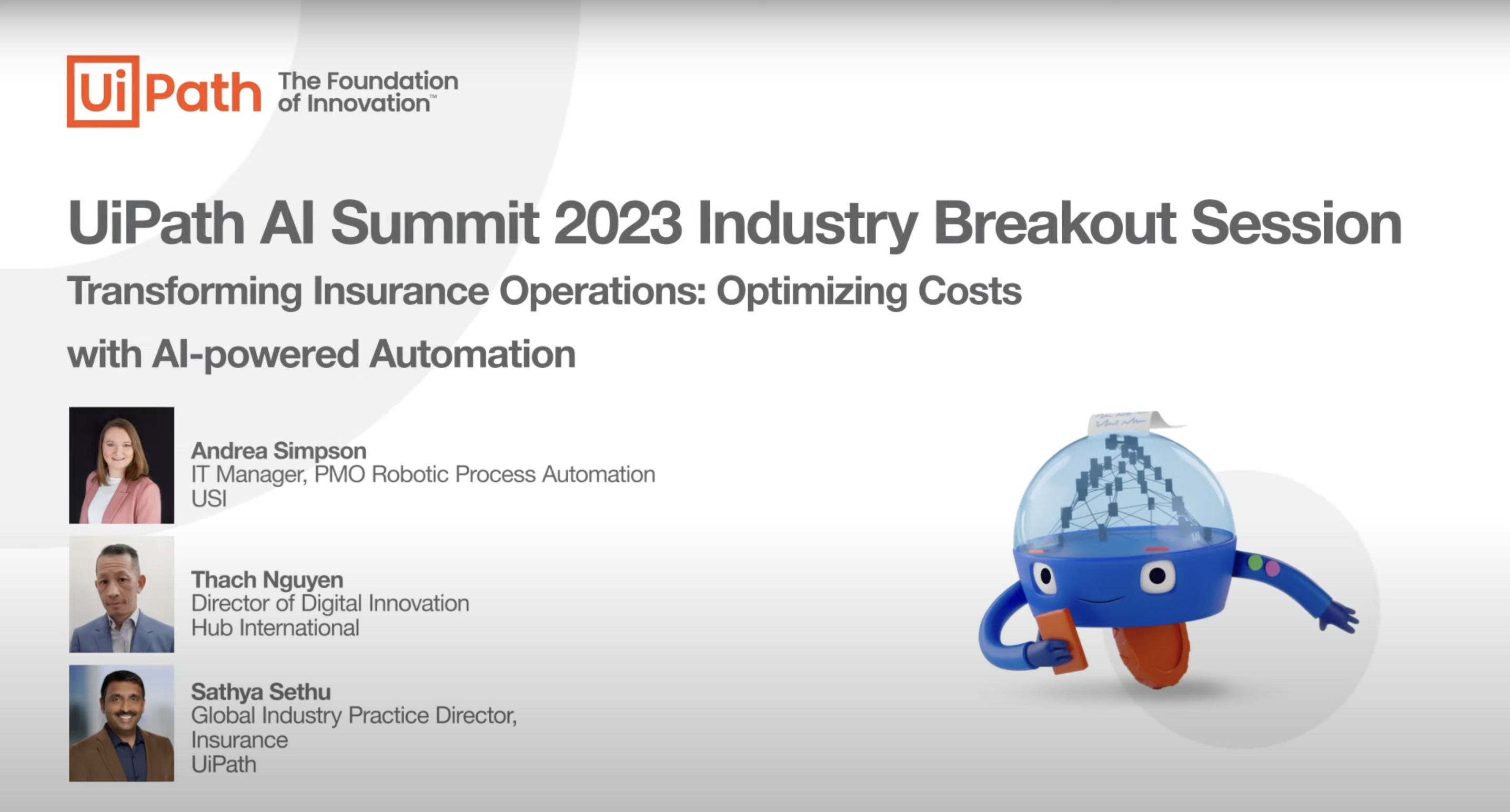Expanding automation benefits with AI in insurance

In our continuously evolving digital era, it's no surprise that every industry is undergoing significant change. And the insurance sector is right in the midst of this revolution.
Automation and artificial intelligence (AI) aren't distant dreams. They're very much present, drastically altering the operations and customer interactions of insurers. At the UiPath AI Summit 2023, the key players in the industry, Andrea Simpson, IT Manager - PMO Robotic Process Automation at USI, and Thach Nguyen, Director of Digital Innovation at Hub International, shared their insights, shedding light on how these technologies are reshaping the insurance landscape and what’s next on the horizon.
From basic automation to AI synergy
Before 2018, automation was largely interpreted as a tool dominated by robotic process automation (RPA) aimed at managing distinct, isolated tasks. As Nguyen reflected, "Historically, automation in insurance appeared more like a tool where every problem was a nail to its hammer." This description captures the initial phase, characterized by a bottom-up methodology, prioritizing the more basic tasks.
However, the winds changed direction around 2022. Skyrocketing operational costs, driven by unprecedented workforce shifts and the “year of great resignation”, forced a paradigm shift. The industry now harnesses automation for dual purposes: cost efficiency and elevating the customer journey. What were once modest efficiency goals of 8–12% have scaled to 15–20%. This highlights the growing focus on human-AI collaboration in strategic decision making.
Powering efficiency and growth with AI integration
USI’s automation journey began in 2019 in collaboration with UiPath. Starting with the automation of standard, repetitive accounting functions, they steadily scaled automations, eventually embracing AI to further streamline operations.
When faced with challenges such as increased staff turnover during the Great Resignation, Simpson’s team leveraged AI-powered automation, observing a profound shift in results. She highlighted the immense value realized from automating functions such as direct bill commissions and underwriting data entry.
Their top achievements include:
Deploying AI and machine learning to interpret various templates from numerous carriers for direct bill commissions, saving over a million dollars annually
Fully automating the intricate underwriting data entry, ensuring real-time client application updates
Streamlining and automating remittance email processes, freeing up 800 hours annually
From adoption to expansion
Nguyen laid out an intricate map of Hub International’s journey in the realm of AI-powered automation. The initial phase involved taking baby steps by adopting basic automation in accounting. This was a critical stage not just in terms of operational tweaks, but as a proof of concept that helped to secure the vital investments needed to take their plans to the next level.
Once the financial support was in place, Nguyen's team pivoted to scaling their program. The focus wasn't just to increase the volume of automated tasks but also to diversify the kinds of tasks being automated. They expanded beyond the limited scope of accounting, weaving automation into diverse business departments throughout the company.
Summarizing the transformation, Nguyen remarked, "Automation began as merely a tool for us—a mechanism to streamline repetitive tasks. However, its role in our organization has grown phenomenally. It's now an enabler, a catalyst that empowers us to achieve more than we initially thought possible. Our relationship with automation has matured to the point where we've evolved from seeing ourselves as just another resource to becoming genuine business partners."
For Nguyen and his team, the journey hasn't been about simply automating manual labor. Their vision is more ambitious. They are interested in the capability of automation and AI to refine decision making processes within the company. For example, sophisticated algorithms can analyze massive sets of data to offer insights that were previously either too complex or too time-consuming to obtain manually. This depth of analytics is a game-changer in strategic planning and operational efficiencies.
Moreover, the team is focusing on reducing the complexity of existing workflows, particularly in high-stakes, intricate areas such as brokerage. Here, automation has proven to be incredibly useful in handling large data sets, especially concerning broker information management. It's also been an invaluable asset in facilitating mergers and acquisitions. By automating due diligence and data integration processes, the company is able to make more informed choices more quickly, thereby gaining a competitive edge in the fast-paced world of mergers and acquisitions (M&As).
AI-powered automation as the new norm
Whether it’s streamlining routine duties like sending remittance emails or handling intricate tasks in direct bill commission processes, it’s clear that automation and AI have transitioned from being optional add-ons to becoming indispensable components of insurance operations.
As the sector propels forward, embracing and mastering these transformative technologies will dictate not just success but survival. The insights shared by industry experts at the UiPath AI Summit 2023 only reiterate the magnitude and urgency of this digital transformation.
To access the complete recording of this session and explore other must-watch sessions on AI-powered automation, visit the AI Summit on-demand recordings.

Be sure to join us for the Financial Services Summit at UiPath FORWARD VI. The Financial Services Summit starts at 3:30 pm PDT on Wednesday, October 11, 2023.

Product Marketing Manager, UiPath
Get articles from automation experts in your inbox
SubscribeGet articles from automation experts in your inbox
Sign up today and we'll email you the newest articles every week.
Thank you for subscribing!
Thank you for subscribing! Each week, we'll send the best automation blog posts straight to your inbox.



